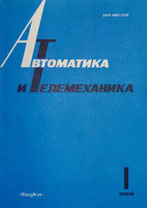|
|
Avtomatika i Telemekhanika, 1980, Issue 3, Pages 145–155
(Mi at7003)
|
 |
|
 |
Developing Systems
Aggregation decomposition for functional systems
V. I. Tsurkov
Moscow
Abstract:
A decomposition method is proposed for finding an extremal element in a certain class of systems. Some of the links in the system are assumed to have a block-diagonal structure while another part and the criterion are separable into blocks. The decomposition proceeds by aggregating the variable and using the duality principle.
Received: 21.12.1978
Citation:
V. I. Tsurkov, “Aggregation decomposition for functional systems”, Avtomat. i Telemekh., 1980, no. 3, 145–155; Autom. Remote Control, 41:3 (1980), 408–415
Linking options:
https://www.mathnet.ru/eng/at7003 https://www.mathnet.ru/eng/at/y1980/i3/p145
|

|




 Contact us:
Contact us: Terms of Use
Terms of Use
 Registration to the website
Registration to the website Logotypes
Logotypes








 Citation in format
Citation in format 